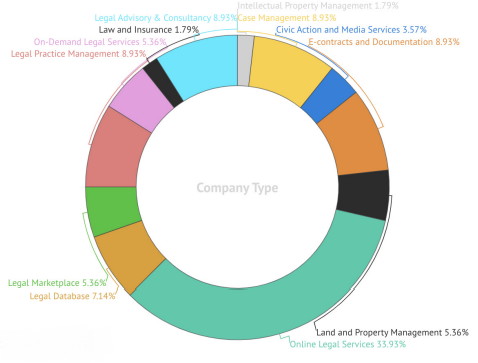Inside South Africa’s Burgeoning Legal Tech Sector

Technology-driven innovation aimed at streamlining the practice of law has led to the creation of legal startups. Afriwise’s 2020 Tech for the Law Sector Study states that 77.5% of respondents think the COVID-19 epidemic would result in some kind of reform.
The legal profession requires precise and frequently time-consuming work in document management, research, and interpretation. Additionally, it calls for regular and simple access to the general public, plaintiffs, defendants, worried relatives, or helping organizations. There is a need for intelligent and effective platforms or software because there is so much work to be done.
Statistics showing that 70% of Africans utilize the internet and the expanding legal tech market continue to show how ready Africa is to adopt legal tech solutions. In fact, it was predicted that the legal tech sector will account for 3% of the legal market by July 2022. Online legal services are provided by about 40% of legal startups. Legal practice management (26%), marketplace platforms for lawyers (10%), legal documentation (5%), and e-discovery (15%) are additional services.

chart illustrating the legal tech startups across Africa by company type
The previous decade has seen a remarkable era of technical advancement on a worldwide scale. On a scale that was previously inconceivable, many technological revolutions are taking place, transforming how we conduct business. African law firms are increasingly using technology to assist their clients. The legal tech community is expanding and changing as more and more clients ask for technological solutions tailored to the African commercial markets.
The South African legal tech business is proof that legal professionals and those looking for legal advice are increasingly adopting computer-based techniques.
Growing Legal tech
Law firms are gradually integrating technology into their practices in order to better serve their clients’ requirements through streamlined workflows and to educate themselves on the newest technologies that clients are using to improve service delivery to their clients. Lawyers must adapt to the way that clients do business. As more and more of their clients move online to provide services to a population that is mostly computer literate, technology has propelled the legal profession into the future.
It’s interesting to note that this technological drive is not just internal. We also conducted a poll for in-house attorneys toward the end of last year. According to reports, 67.9% of in-house counsel in Africa wanted and anticipated that the law firms they worked with would adopt new technologies. The takeaway is crystal clear: if you don’t innovate or use legal technology, you will fall behind.
South Africans’ need for digital technology has led to innovative service delivery methods being used by legal companies and attorneys. More efficiency and improved service delivery result from doing things this way.
The Covid 19 epidemic has expedited the spread of technology into the legal system. This has increased the effectiveness of legal professionals by leading to the creation of new technologies and simple legal procedures. The speed with which it has developed and the fact that it is not just limited to private practices or in-house legal teams are particularly intriguing aspects of Africa’s expanding legal tech landscape. Instead, many business owners have tried to employ legal technology to make it simpler for non-lawyers to get the most recent information on their legal rights or obligations, whether it be hiring a lawyer or forming a corporation.
South African Disruptors
African legal tech startups serve a wide spectrum of clients, including non-lawyers, in-house counsel, and private practice. Given how many sectors African legal tech has branched out into recently, the range of legal technology is astonishing.
The development of technology in South Africa has made it easier to acquire legal services and handle services like contract management, practice management, legal research, online case and law databases, digital case and evidence management systems, e-courts, and e-discovery. The nation is now recognized as the continent’s top center for legal technology because to this trend.
Serisha Barrat’s Lawyered Up and Nyasha Makamba‘s LawBasket, for example, have made it a priority to offer South Africans effective consulting services. Startups, SMMEs, and township enterprises can access legal services on their digital platform for an inexpensive price.
As a creative legal firm, Legalese takes great pride in this. As it takes care of the legalities, the startup assists firms in concentrating on realizing their goals. It succeeds because of its many years of experience working in corporate law firms, its extensive knowledge of South Africa’s creative industry, and its background in starting and growing businesses.
Also, the Citizen Justice Network is a really impressive new company. The Citizen Justice Network, in the first place, works to bring about justice, particularly for individuals in under-reported areas. Due to the fact that most African nations still contain areas like these, focusing on underreported areas is crucial.
The fast pace of the technological revolution has contributed to the growing result in the legal tech profession, it is growing and it is up to founders to keep up.
